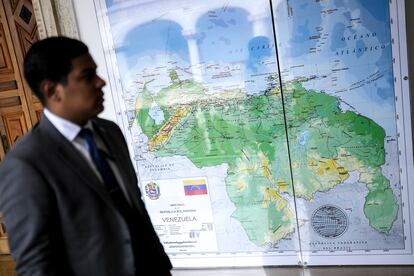A British warship arrives in Guyana as tensions heat up in border dispute with Venezuela
The HMS Trent’s visit led Venezuela to begin military exercises a day earlier in the eastern Caribbean near its border with Guyana as the Venezuelan government presses its claim to a huge swath of its smaller neighbor

A British warship arrived in Guyana on Friday afternoon amid rising tensions from a border dispute between the former British colony and Venezuela.
The HMS Trent’s visit led Venezuela to begin military exercises a day earlier in the eastern Caribbean near its border with Guyana as the Venezuelan government presses its claim to a huge swath of its smaller neighbor.
Brazil’s Ministry of Foreign Affairs expressed concern Friday about the situation and urged the two South American countries to return to dialogue. It said other nations should avoid “v” that support either side.
Brazil’s statement called on Guyana and Venezuela to stay true to the Argyle Declaration, an agreement signed earlier this month in which their leaders said they would solve the border dispute through nonviolent means.
The dispute is over Essequibo, a sparsely populated region that is the size of Florida and rich in oil and minerals. Venezuela has long claimed it was cheated out of the territory when Europeans and the U.S. set the border.
The U.K. Defense Ministry has said that the ship is visiting Guyana as part of a series of engagements in the region and that the vessel will conduct training exercises with Guyana’s military.
On its account on X, formerly Twitter, the ship posted photos of sailors welcoming Britain’s ambassador to Guyana and the chief of staff of Guyana’s Defense Force, Brig. Gen. Omar Khan. They were hosted at a formal lunch and provided with a tour of the ship’s capabilities.
In an interview with The Associated Press, Khan said such operations “remain an important part of the regional security spectrum of activities. It has been so in the past and will continue in the future.”
Officials have been tight-lipped on the nature of the exercises.
The warship is generally used to intercept pirates and drug smugglers, and it recently conducted joint exercises with the navies of several West African nations. It is equipped with cannons and a landing pad for helicopters and drones and can carry around 50 marines.
In a statement late Thursday, Guyanese President Irfaan Ali said Venezuela “had nothing to fear” from the ship’s activities in Guyanese waters.
“Guyana has long been engaged in partnerships with regional and international states aimed at enhancing internal security,” Ali said. “These partnerships pose a threat to no one and are in no way intended to be aggressive.”
But Venezuela on Thursday began military exercises involving 5,000 troops in the eastern Caribbean, citing the visit by the British patrol ship.
In a nationally televised speech, Venezuelan President Nicolas Maduro accused Guyana of betraying the spirit of the Argyle Declaration.
“We will not let anyone push us around,” Maduro said, surrounded by military commanders. He described Britain’s decision to send a warship as a threat from a “decaying former empire.”
Guyana has controlled Essequibo for decades, but Venezuela revived its historical claim to the region earlier this month through a referendum in which voters were asked whether the territory should be turned into a Venezuelan state.
Critics of Maduro say the socialist leader has reignited the border dispute to draw attention from the nation’s internal problems as Venezuela prepares for a presidential election next year. Maduro intends to run for a third term.
Venezuela says it was the victim of a land theft conspiracy in 1899, when Guyana was a British colony and arbitrators from Britain, Russia and the United States decided the boundary.
Venezuelan officials also argue that an agreement among Venezuela, Britain and the then colony of British Guiana signed in 1966 to resolve the dispute effectively nullified the original arbitration.
Guyana maintains the initial accord is legal and binding and asked the United Nations’ top court in 2018 to rule it as such, but a decision is years away.
Sign up for our weekly newsletter to get more English-language news coverage from EL PAÍS USA Edition
Tu suscripción se está usando en otro dispositivo
¿Quieres añadir otro usuario a tu suscripción?
Si continúas leyendo en este dispositivo, no se podrá leer en el otro.
FlechaTu suscripción se está usando en otro dispositivo y solo puedes acceder a EL PAÍS desde un dispositivo a la vez.
Si quieres compartir tu cuenta, cambia tu suscripción a la modalidad Premium, así podrás añadir otro usuario. Cada uno accederá con su propia cuenta de email, lo que os permitirá personalizar vuestra experiencia en EL PAÍS.
¿Tienes una suscripción de empresa? Accede aquí para contratar más cuentas.
En el caso de no saber quién está usando tu cuenta, te recomendamos cambiar tu contraseña aquí.
Si decides continuar compartiendo tu cuenta, este mensaje se mostrará en tu dispositivo y en el de la otra persona que está usando tu cuenta de forma indefinida, afectando a tu experiencia de lectura. Puedes consultar aquí los términos y condiciones de la suscripción digital.








































